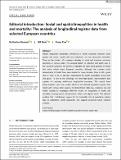Editorial introduction: Social and spatial inequalities in health and mortality : the analysis of longitudinal register data from selected European countries
Date
08/04/2022Funder
Grant ID
SBF004\1093
ES/R009139/1
834103
ES/K007394/1
ES/K000446/1
Keywords
Metadata
Show full item recordAbstract
Health inequalities—systematic differences in health outcomes between social groups and across spatial units—are ubiquitous, but not necessarily inevitable. They are the product of a complex interplay of social and economic processes operating at various scales. The unequal pattern of infection and death seen in the Covid-19 pandemic has served to highlight the stark social gradient in health that exists within many European countries. Although the complex social determinants of health have been studied for many decades, there is still a great deal of work to do to elucidate explanations for health inequalities across time and space. To rise to the challenge, we need high-quality, representative data capable of capturing multi-scalar longitudinal processes. This special issue brings together eight new studies which all use national population register data linked with various other sources of administrative data (e.g., residence, tax and health records) to investigate different vectors of inequalities in health and mortality, covering spatial, socioeconomic, ethnic and migrant status. This editorial outlines their contributions, argues for the invaluable role of population register data to understand health inequalities and suggests promising future research avenues.
Citation
Keenan , K L , Kulu , H & Cox , F M 2022 , ' Editorial introduction: Social and spatial inequalities in health and mortality : the analysis of longitudinal register data from selected European countries ' , Population, Space and Place , vol. 28 , no. 3 , e2411 . https://doi.org/10.1002/psp.2411
Publication
Population, Space and Place
Status
Peer reviewed
ISSN
1544-8444Type
Journal item
Description
Funding: Economic and Social Research Council. Grant Numbers: ES/K007394/1, ES/K000446/1; European Union's Horizon 2020 research and innovation programme. Grant Number: 834103.Collections
Items in the St Andrews Research Repository are protected by copyright, with all rights reserved, unless otherwise indicated.
Related items
Showing items related by title, author, creator and subject.
-
Wellbeing and social network characteristics in rural communities : findings from a cohort in social housing in Cornwall, United Kingdom
Long, Emily; Stevens, Sebastian; Topciu, Raluca; Williams, Andrew James; Taylor, Timothy; Morrissey, Karyn (2022-05-19) - Journal articleBackground: The mental wellbeing of those living in resource poor and rural localities is a public health priority. Despite evidence of a link between social networks and mental wellbeing, little is known about this ... -
Adolescents' intense and problematic social media use and their well-being in 29 countries
Boer, Maartje; van den Eijnden, Regina J.J.M.; Boniel-Nissim, Meyran; Wong, Suzy Lai; Inchley, Joanna C.; Badura, Petr; Craig, Wendy M.; Gobina, Inese; Kleszczewska, Dorota; Klanšček, Helena J.; Stevens, Gonneke W.J.M. (2020-06) - Journal articlePurpose: This study examined (1) whether intense and problematic social media use (SMU) were independently associated with adolescent well-being; (2) whether these associations varied by the country-level prevalence of ... -
On order and disorder during the COVID-19 pandemic
Reicher, Stephen David; Stott, Clifford (2020-07) - Journal articleIn this paper, we analyse the conditions under which the COVID‐19 pandemic will lead either to social order (adherence to measures put in place by authorities to control the pandemic) or to social disorder (resistance to ...

